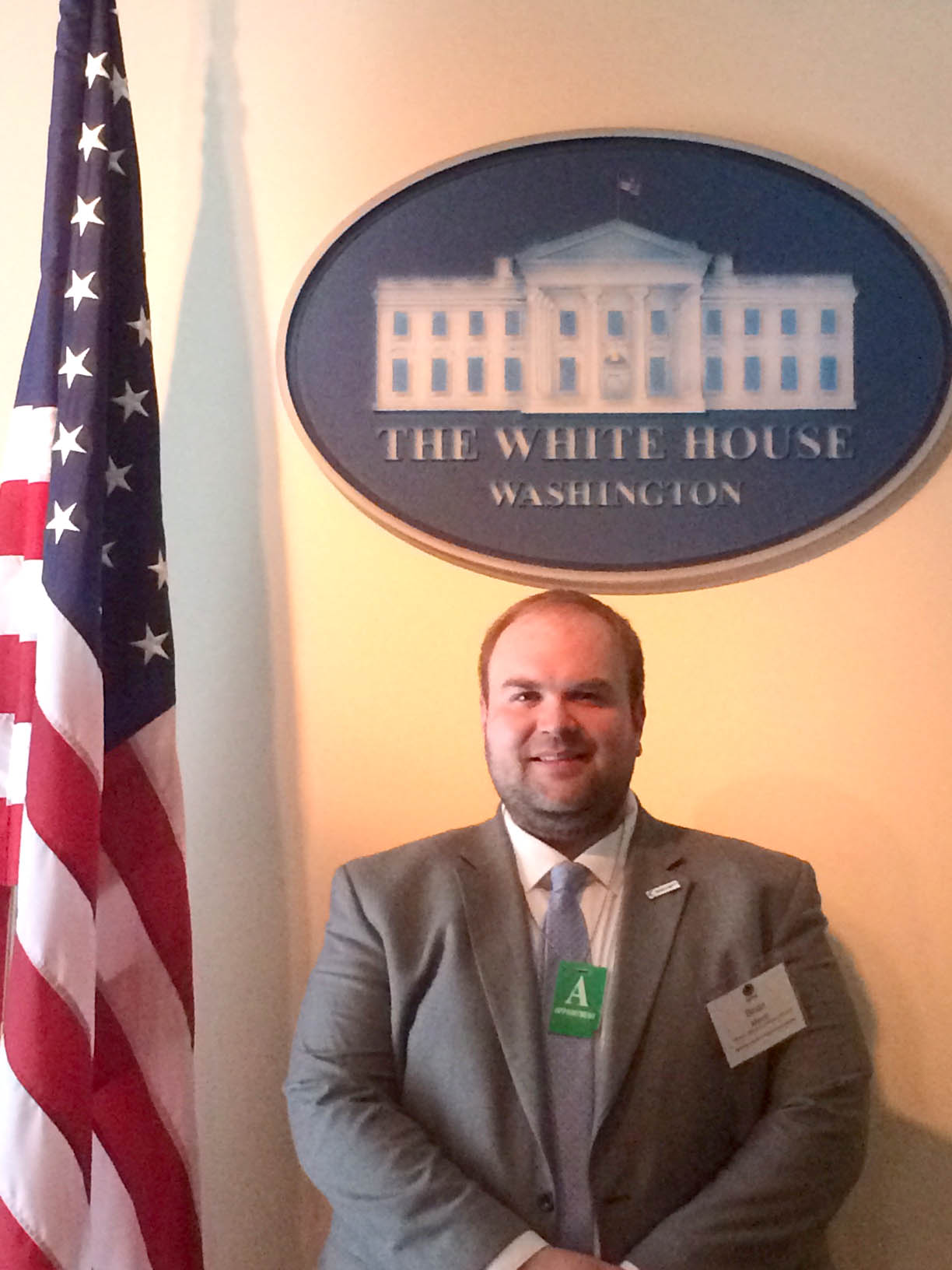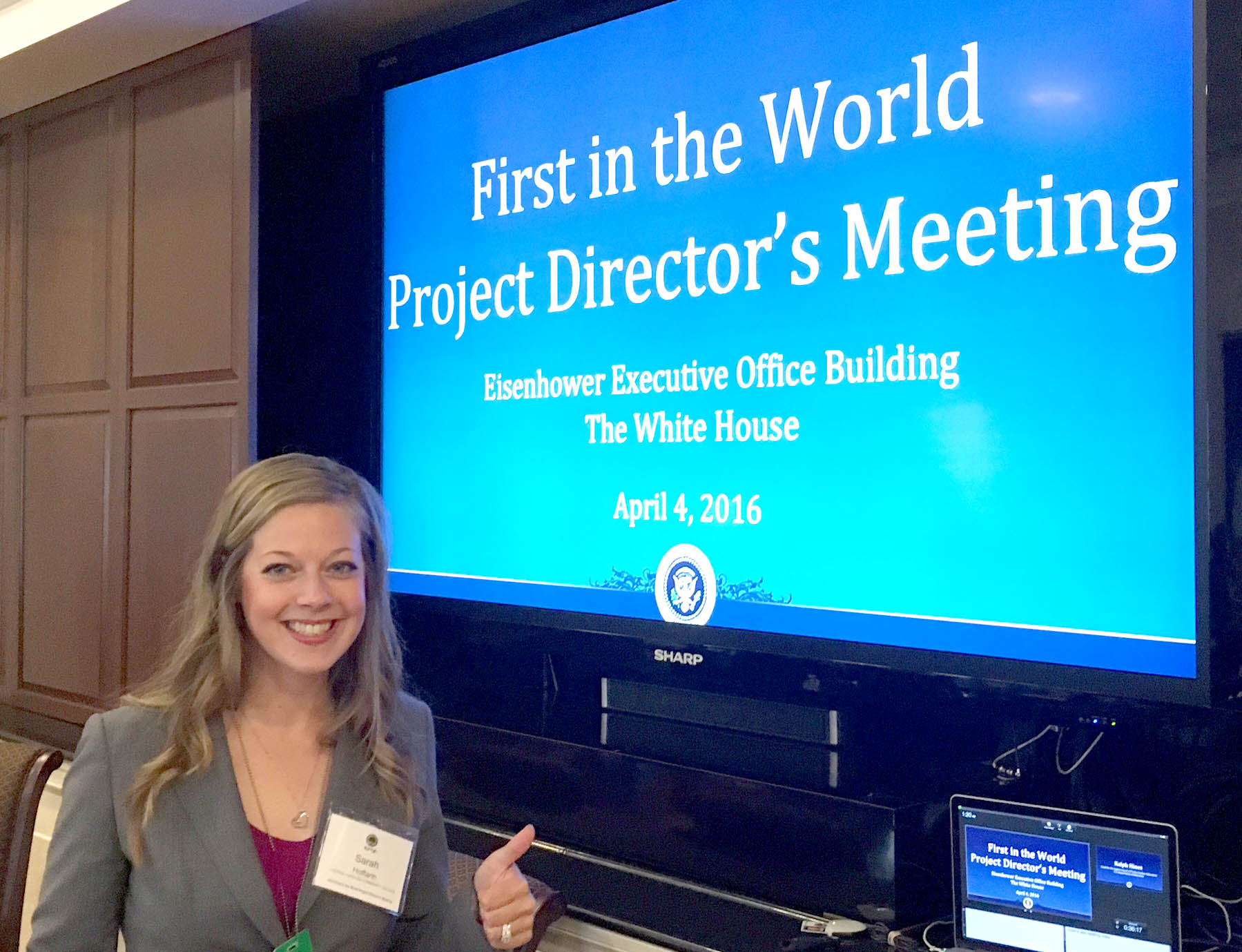
Dr. Brian S. Merritt, Central Carolina Community College's Vice President of Student Learning & Chief Academic Officer, made a presentation in the White House about the plans for the First in the World grant in 2016.

SANFORD - In 2015, Central Carolina Community College (CCCC) embarked on a journey with nine additional North Carolina Community Colleges to help validate a solution that could help boost community college student success. CCCC led the "Carolina Works" project to spread the proactive success coach model to improve student outcomes across North Carolina with the ultimate goal to validate coaching as a proven student success strategy.
The 2015 consortium project was funded by a $9.2 million First in the World validation grant by the U.S. Department of Education. The grant remains the largest in the history of Central Carolina Community College.
Central Carolina's history with success coaching dates back to 2012 when the college launched a College Success Center with a team of success coaches who collaborate with faculty and staff to provide individualized academic and personal support for students who need it the most. Success coaches collaborate with faculty and staff using an innovative early alert/advising system powered by Aviso Retention.
In North Carolina, as the economy grows, the vast majority of new jobs require education beyond a high school diploma -- but fewer than half of North Carolinians ages 25-44 have high-quality credentials or postsecondary degrees. Therefore, in 2019, the myFutureNC goal was established, stating a bold vision for the future of education in the state: "ensuring that by 2030, 2 million North Carolinians have a high-quality credential or a postsecondary degree." myFutureNC recently announced this goal has now been endorsed by the 58 colleges of the North Carolina Community College System.
With the results of this project, success coaching is now a proven way to close equity gaps with attainment and help meet North Carolina's ambitious goal.
Dr. Brian S. Merritt, Central Carolina Community College's Vice President of Student Learning & Chief Academic Officer, led the effort to secure the First in the World grant and provided oversight for the project. "Success coaching is now a proven strategy that helps us serve students more holistically and to close achievement gaps. When we launched our success team in 2012, we began to see immediate results in student retention and success over those next few years. But, we were eager to understand why and how, and to prove -- with hard evidence -- that it does work," said Merritt. "Along with our national partners, expert evaluators at DVP-PRAXIS, early alert software Aviso Retention, and nine amazing partner institutions, we have now learned lessons that will inform student success work for decades to come."
The First in the World program was designed by the U.S. Department of Education to support the development, replication, and dissemination of innovative solutions and evidence for what works in addressing persistent and widespread challenges in postsecondary education for students who are at risk for not persisting in and completing college.
With the "Carolina Works" project findings, success coaching, or essentially relationship-building with a professional on campus, is found to be a way forward to close equity gaps and help more students advance to complete their degrees and other courses of study.
Here are the key findings from the project (see research brief at www.dvp-praxis.org):
Longer-term engagement between students and success coaches (especially face-to-face meetings) brings better results, as it takes time to develop quality relationships with students.
Students assigned a coach are 4% more likely to stay enrolled for two academic years (fall to second spring semester).
***
Students benefit more from success coaching when their coaches don't change, as building trusting, personal relationships with coaches takes time.
Students who had the same coach for the duration of the study experienced a 12% increase in credential completion.
***
The most promising results came from colleges that implemented the program with fidelity - demonstrating strong leadership support and successfully folding coaches into their existing staff.
The top performing colleges saw a 9% increase in longer-term retention and a 9% increase in credential completion for their students who had coaches.
***
Black students and male students are especially likely to benefit from success coaching when compared to all students.
Male students assigned a success coach experienced an 8% increase in fall-to-fall retention and an 8% increase in credential completion.
Black students assigned to a coach are 8% more likely to remain enrolled for a year (fall-fall retention) and 18% more likely to stay enrolled for two academic years (fall to second spring semester)
National expert, Jobs For the Future, served as an advisor and advocate for the project. JFF seeks to design and drive the adoption of innovative and scalable education and career training models and systems that leads from college readiness to career advancement. JFF also develops and advocates for federal and state policies needed to support these solutions.
Dr. Derek Price, President of DVP-PRAXIS, served as the independent evaluator for the grant. Dr. Price is the former Director of Higher Education Research for the Lumina Foundation for Education and has extensive experience as a higher education research. The Carolina Works project design modeled a research study by Bettinger & Baker (2011) titled, "The effects of student coaching in college: An evaluation of a randomized experiment in student mentoring." That study found proactive success coaching to increase retention 14 percent for a control group over a 24-month period.
The nine partner colleges are Caldwell Community College and Technical Institute, Carteret Community College, Cleveland Community College, College of the Albemarle, Isothermal Community College, Pamlico Community College, Randolph Community College, Roanoke-Chowan Community College, and Southwestern Community College.
"I think it's incredible that 10 relatively small, rural, N.C. community colleges were able to come together as a consortium and not only stand up successful Success Coaching programs but also implement the Aviso technology all while maintaining the integrity of a rigorous randomized controlled trial," said Sarah Deal, Ph.D., who served as CCCC First in the World project co-director. "I think it speaks to the dedication and commitment our colleges have to the success of students and highlights the amazing, talented professionals we have working across our system."
Central Carolina Community College offers a wide variety of programs, as students can earn associate degrees or college transfer credits, diplomas, or certificates. CCCC also offers instruction in such areas as Short-term Job Training, College & Career Readiness, Personal Interests, Business & Industry, and Emergency Services Training. CCCC has been nationally ranked as No. 25 in The Best Community Colleges & Trade Schools of 2020 by BestColleges and ranked first in the Niche 2020 Best Community Colleges in North Carolina rankings.
For more information on Central Carolina Community College, visit www.cccc.edu.

Dr. Brian S. Merritt, Central Carolina Community College's Vice President of Student Learning & Chief Academic Officer, made a presentation in the White House about the plans for the First in the World grant in 2016.

CCCC First in the World project co-director Sarah Deal visited the White House and the Department of Education in 2016.